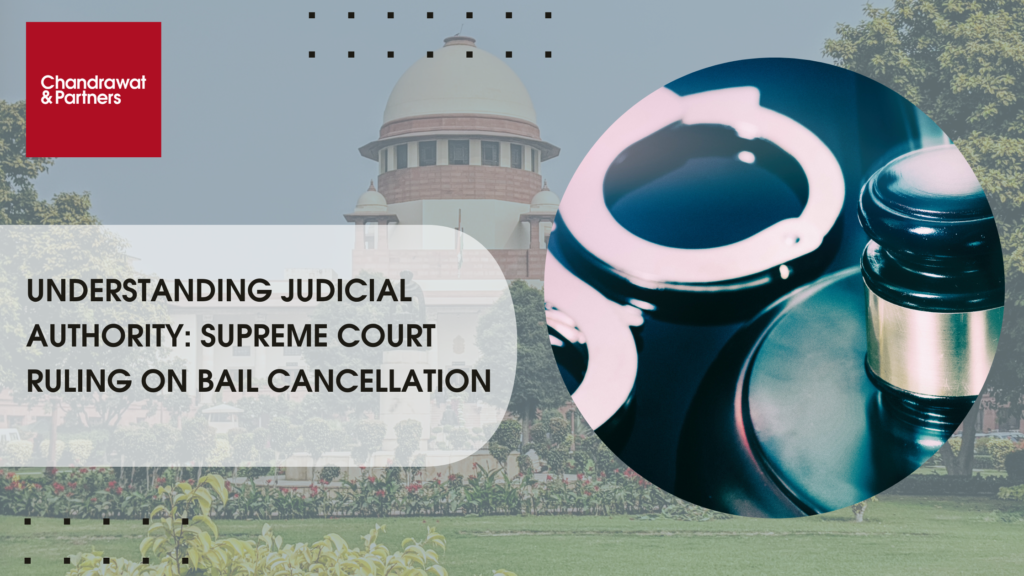Share :
Introduction
A major decision concerning the revocation of bail was recently rendered by the Supreme Court in the case of Himanshu Shamra V. Union of India, sparking debates and discussions both inside and outside of the legal community. With all of its subtleties and ramifications, this decision might fundamentally alter the criminal justice system in our nation. This essential judgment not only explains the principles governing bail cancellation but also highlights the significance of maintaining legal norms to ensure equitable and just legal proceedings.
THE SUPREME COURT’S DECISION
The Supreme Court laid down in it’s ruling the crucial guidelines concerning the cancellation of bail granted to an accused person. The court emphasized that bail once granted should not be cancelled in a mechanical manner, but only in exceptional circumstances. It stressed the importance of preserving the presumption of innocence and protecting individual liberties while ensuring the interests of justice are upheld.
KEY POINTS HIGHLIGHTED BY SUPREME COURT
- Presumption of Innocence: The court reiterated that every individual is presumed innocent until proven guilty and emphasized the need to safeguard this fundamental principle of criminal jurisprudence. Cancelling the bail should not be a knee-jerk reaction but should be based on compelling reasons supported by evidence.
- Judicial Discretion: The ruling underscored the importance of judicial discretion in matters of bail cancellation. Judges were cautioned against succumbing to external pressures or public sentiment and reminded of their duty to impartially evaluate each case on its merits.
- Exceptional Circumstances: Bail should only be cancelled in exceptional circumstances where the conduct of the accused jeopardizes the fair trial process, poses a threat to the safety of witnesses, or undermines the integrity of the judicial system. Mere apprehension or speculative concerns are insufficient grounds for bail cancellation.
- Proportionality and Fairness: The court stressed the need for proportionality in decisions regarding bail cancellation. The severity of the alleged offense, the likelihood of the accused tampering with evidence, and the potential impact on the victim should be carefully weighed against the individual’s right to liberty.
IMPLICATIONS AND SIGNIFICANCE
The Supreme Court’s ruling has far-reaching implications for the criminal justice system, judicial proceedings, and individual rights. By setting clear guidelines for bail cancellation, the court seeks to strike a balance between the interests of justice and the protection of individual liberties.
- Protection of Individual Rights: The ruling reaffirms the importance of safeguarding individual rights, particularly the right to liberty. It prevents arbitrary and unjustified deprivation of liberty by imposing stringent criteria for bail cancellation.
- Legal Certainty: The guidelines provided by the Supreme Court bring clarity and certainty to the process of bail cancellation, ensuring consistency and fairness in judicial decisions across different jurisdictions.
- Judicial Accountability: By emphasizing the need for reasoned and well-founded decisions, the ruling promotes judicial accountability and discourages arbitrary exercise of power.
Streamlining Judicial Processes: The focus on exceptional circumstances and compelling reasons for bail cancellation helps streamline judicial processes, reducing delays and ensuring expeditious disposal of cases.
Conclusion
The Supreme Court’s ruling on bail cancellation represents a significant milestone in the evolution of criminal jurisprudence in our country. By upholding the principles of fairness, proportionality, and judicial discretion, the court has reaffirmed its commitment to protecting individual rights and upholding the rule of law. It is incumbent upon all stakeholders, including judges, lawyers, and law enforcement agencies, to adhere to these guidelines and uphold the integrity of the justice system. As we navigate the complexities of criminal justice, it is essential to strike a delicate balance between the interests of the state and the rights of the individual, ensuring that justice is not only served but also seen to be served.
For more information or queries, please email us at
enquiries@chandrawatpartners.com




